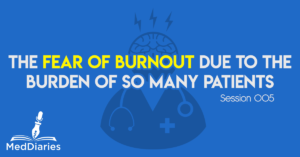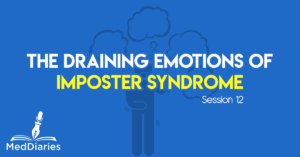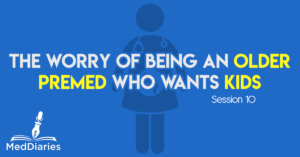
Session 05
In this episode, we hear from a premed who feels overwhelmed by the sheer number of patients needing help. She is working in the emergency department and feels overwhelmed by the number of sick patients coming to them who need care. How can you make sure you stay in the moment?
[01:15] Poster of the Week
“I’m a premed that works as a tech in the ER. I’m still learning so there’s a lot that I don’t know yet. I just got my first foley the other day and it was pretty exciting for me. Lately, I’ve been having a really hard time with the premed path though. Getting into the hospital and seeing the way staffing can be sometimes and seeing how many sick people have to be taken care of all the time. It just seems too momentous sometimes but there’s just so many patients of such a high acuity and it’s just hard. I can just see why everyone’s getting burned out. I just didn’t know if anybody had any advice for once you get there, what’s the ratios and things look like as a physician.”
[02:30] Being Overwhelmed by the Number of Sick Patients
First off, congratulations on getting your first foley catheter and that’s a big accomplishment. It takes a lot to get that done so that’s a big deal! On another note, it’s good you’re already noticing the reason burnout happens even at this stage.
Being overwhelmed by the number of sick patients needing care all the time never stops. It probably only differs in terms of where you’re practicing medicine. In an ER department, it’s a very busy place. There’s a lot going on and a lot of people need care all the time. But if you think about a primary care outpatient office or a urology office, this can feel completely different.
It also makes a big difference geography-wise. Being out in a rural community where there are a few people is a lot different from a very busy urban center. It’s going to vary in an academic center as well.
'There's such a huge spectrum in the world of practicing medicine in terms of what the level of acuity is, how many patients are being seen, the kind of care being offered.'Click To TweetIf you find that you’re more attracted to really busy environments as a premed and med student, this is something to take notice of. You’d want to gravitate to things that would keep you happy as a physician. That’s part of how we avoid burnout.
But if you find that you don’t like the busyness and the craze of being in an environment with tons of patients all the time, which emergency departments might be, then this may shift your interest over time. You may want to practice in an environment that has a different dynamic in terms of the number of patients.
[05:12] There Will Always Be Patients
All this being said, there being so many sick patients needing care all the time is something you find anywhere you go. By nature, you will always need physicians on this planet to help take care of people when they get sick. Even with electronics and technology, or artificial intelligence, you will always need human beings.
I don’t think a computer could ever replace both a human mind in terms of its capacity for knowledge and being able to practice medicine. That said, there will always be patients and there will always be physicians to care for them and this in and of itself can be overwhelming.
'There will always be patients and there will always be a need for physicians to take care for them.' Click To TweetOver time, during my internship, I would find that patients seem to always come back. Initially, I found this to be incredibly frustrating. You would try to work so hard to get someone all the things they needed. But we’re people and people get sick so they could always come back. So a mindset change was necessary over this whole thing. You have to recognize this is not the end. The goal is not to see them well and they’re never going to come back and they’re well for the rest of their lives. Because people are going to get sick again and they’re going to need help again. Obviously, they’re going to come back to the hospital that knows them. Once you’re able to shift this mentality, chances are this could lessen your burnout. It helps, plus the fact that you have continuity of care with them and their family.
'It's just the nature of it. They're going to come back over and over again but it doesn't mean that you can't make a difference each time that they come.' Click To Tweet[08:52] Medicine vs. Architecture
Medicine is so different from architecture. In architecture, your goal is to build a building and hopefully, it doesn’t keep breaking, otherwise, you’re probably not a very good one. However, in medicine, human beings are going to keep breaking. So we’re fighting against this constant push of disease and accidents and mother nature and trying to get people well and get them healed. It’s a very insurmountable barrier because you’ll never heal everyone. You’ll never fix everybody. You’ll never fix them forever. But you can get them better, at least for a day, a week, ten years, however long it may be.
'Buildings are going to stand tall. Human beings will continue to break down over and over again and need help.'Click To Tweet[10:13] Ratios
Thinking about the numbers can sometimes help you to not worry as much about what you’re going to be faced with. As an intern, I had 10 patients. But duty hours have changed since I was in training.
So I pulled out the University of Washington and looked at their residency program. And most, if not all, have admission caps, which means there are caps on the number of people that you can admit and the number of people that you can take care of. And this must be the standard since the ACGME – the governing body for residency programs – makes things pretty much the same all across the board.
So the school doesn’t allow a first-year resident or intern to admit more than five new patients per admitting day. You can’t be assigned more than 8 patients in a 48-hour period. You can’t be responsible for the ongoing care of more than 10 patients. This hasn’t really changed much when I was still an intern, as well my husband, Ryan.
When you get to that stage as an intern and go to medical school and applied yourself during rotation and have done a sub-internship, you’ll be prepared to take that on. If you’re interested in learning more about ratios, go online to know what it looks like in the future. If you’re feeling burned out, overwhelmed, and scared about what’s in the future, it can help you to have some numbers and just to think about.
[13:05] The Inpatient Realm: Making a Priority List
If you think about inpatient care, there are lots of very sick patients. One of the things that help is focusing on prioritizing. This is something they will teach you when you go through internship. Your mentors and your program directors will teach you about this, as well as your junior and senior residents.
By prioritizing things, it helps you through your day. You’re able to figure out what you need to do for all these patients and where to start. You can’t do everything for all of them all at once. And all of them are going to have different needs.
'You literally make a priority list and knock them down one after another.'Click To TweetWhen you’re in the thick of it, it can be really stressful. So having a system where you really learn to prioritize is what will guide you through that very overwhelming sea of very sick people you have to take care of.
I remember my program director saying he was always nervous if he didn’t see an intern carrying a list. So all of us would have lists of our patients and list of things we needed to do. And you will have that as well.
As an attending physician, it’s just me. So I have a list of patients who I’m consulting on. Again, as to who to see first is a matter of priority. I’m going to see the sickest patients first or rush out to see an acute case. Sometimes in residency, you’d have three acute strokes at one point and you would have to figure out who do you see first. But usually, there would be a team of people to help you.
[15:45] The Outpatient Realm: Thanks to EMRs!
In an outpatient setting, you’d have hundreds, even thousands of patients you’re taking care of. That’s a huge number of people you’re responsible for. Good thing, many electronic medical records (EMRs) are designed to help you, which have built-in tools to help you keep track of things. It could be a source of burnout itself, but having the HR sending you labs and results and messages enables a system in place that prioritizes things for you. And you can also create your own systems for them along with your staff.
Like anything in life, if you create systems for yourself, if you create priorities, that will help you so that it doesn’t feel like this overwhelming ocean of sickness and things you need to do that you can’t do all at once.
'As your responsibilities grow, your systems will grow with them.' Click To Tweet[18:00] The Star Thrower
Loren Eiseley wrote a story called The Star Thrower. And some quotes from that book can hopefully inspire you with regards to dealing with patients.
Once on ancient Earth, there was a human boy walking along a beach. There had just been a storm and starfish had been scattered along with sand. The boy knew the fish would die so he began to fling the fish to the sea. But every time he threw a starfish, another would wash ashore.
An old earth man happened along and saw what the child was doing. He called out, “Boy, what are you doing?” “Saving a starfish,” replied the boy. “But your attempts are useless child. Every time you save one, another one returns. Often, the same one. You can’t save them all. So why bother trying? Why does it matter anyway?” called the old man.
The boy thought about this for a while, a starfish on his hand, and he answered, “Well, it matters to this one.” And then he flung the starfish into the welcoming sea.
[19:57] It Matters to Your Patient
Patients are like fishes on the sand that need to be thrown back into the sea. They need our help but we can’t help them all at once. That’s an impossible goal. We cannot help everybody all the time. That’s why we have teams, shifts, our whole staff work for us. But it matters to each and every single patient that you help.
Finally, I would encourage you that when you are with a patient, your focus is them and that’s what matters. What you do for them, whatever that may be, you are making a difference to that human being. And there’s no greater thing in this world.
So even if you can’t help all patients, at least you can help the person you’re seeing that day. It can be so easy to get overwhelmed by the number of sick patients but just be in the moment.
'Just in the moment, focus on the person who's in front of you because you will not even appreciate probably how much difference you make to that individual.'Click To Tweet[22:33] Share Your Story with Us!
Please share with us what’s going on in your life! Whether you’re having a great moment or not, call 1-833-MYDIARY. Press 1 to leave a message or diary entry. Press 5 to leave feedback on a previous episode, and please let us know which episode you’re referring to.
Links:
The Star Thrower by Loren Eiseley
Listen to Other Episodes
SEARCH SITE
LISTEN FOR FREE
FOLLOW US!
RECENT POSTS
Join our free email newsletter to get updates of the show. Simply enter your name and email.
2018 © MedDiaries.com | All Rights Reserved | Web Design by MAP








